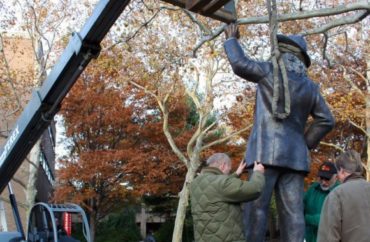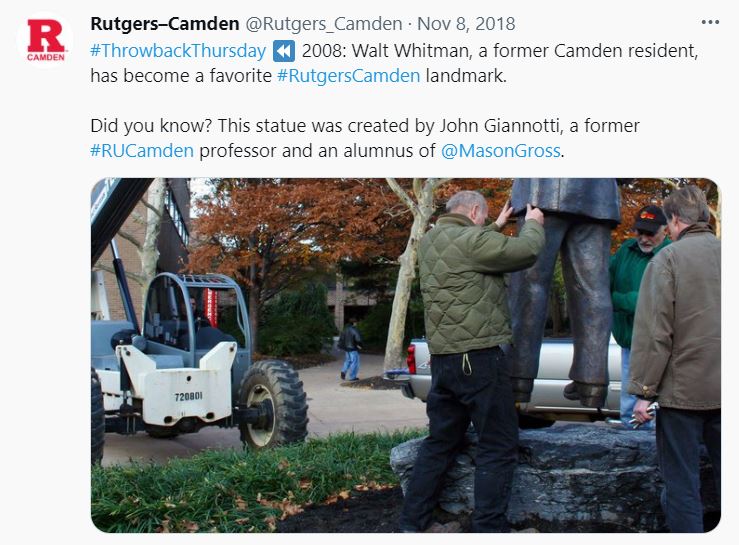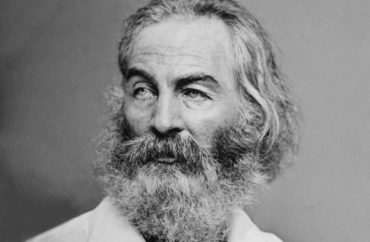
‘Stood for white supremacy and racism against Black and Indigenous Americans,’ critics said
Rutgers University-Camden will remove a statue of the famous poet Walt Whitman from the center of campus as a result of activists’ petitions and a recommendation from a committee of scholars.
The statue of Whitman, featured prominently in the front courtyard of Camden’s Campus Center, will be “relocated to a historically relevant site on campus and contextualized,” interim Chancellor Margaret Marsh recently announced in an email to students and employees.
That new location has yet to be announced by campus officials.
A petition circulated last year stated that “the statue of Walt Whitman glorifies a man who we should not hold such a place of honor on our campus. … He instead stood for white supremacy and racism against Black and Indigenous Americans.”
To address the protests, a Committee on Public Art and History was created, which recently advised Marsh on the statue’s fate as well as a mosaic frieze on the facade of Cooper Library that includes images of Christopher Columbus and Native Americans.

The mosaic was covered up last summer after some alleged the artwork is racist. Marsh announced it “will be contextualized and the frieze will be uncovered.”
The university will also “establish a formal day to honor and explore the history of Rutgers–Camden, with a particular emphasis on narratives related to racial justice, diversity, equity, and inclusion,” Marsh announced.
The event is scheduled to be introduced in spring 2022.
As for Whitman’s racist beliefs, they have not been lost on observers, and some on both the left and the right have debated whether the poet should be canceled because of them.
 “I think our job as scholars, teachers, historians, and students is to understand the people and books and ideas of the past on their own terms–as they really are. Then we can choose to embrace the truth and discard error,” Kelly Scott Franklin, a professor of English literature at Hillsdale College and a scholar of Whitman, told The College Fix in an interview last year.
“I think our job as scholars, teachers, historians, and students is to understand the people and books and ideas of the past on their own terms–as they really are. Then we can choose to embrace the truth and discard error,” Kelly Scott Franklin, a professor of English literature at Hillsdale College and a scholar of Whitman, told The College Fix in an interview last year.
Whitman’s statue pays homage to the author of the seminal work “Leaves of Grass,” as the poet lived in Camden upon his death in 1892 at age 72.
A tweet from the official Rutgers-Camden Twitter account in 2018 had called the statue “a favorite #RutgersCamden landmark.”
“Ultimately,” Franklin had said, “the advocates of censorship will leave us with no statues of anyone. Because if you have a statue of a human being, that human being is going to be just like you: a flawed and imperfect person.”
The College Fix reached out to five professors with the University’s English Department, including Keith Green, co-chair of Committee on Public Art and History and director of the Africana Studies department.
All declined comment or did not respond.
MORE: Petition demands statue of Whitman removed from Rutgers
Like The College Fix on Facebook / Follow us on Twitter






Please join the conversation about our stories on Facebook, Twitter, Instagram, Reddit, MeWe, Rumble, Gab, Minds and Gettr.